Reports
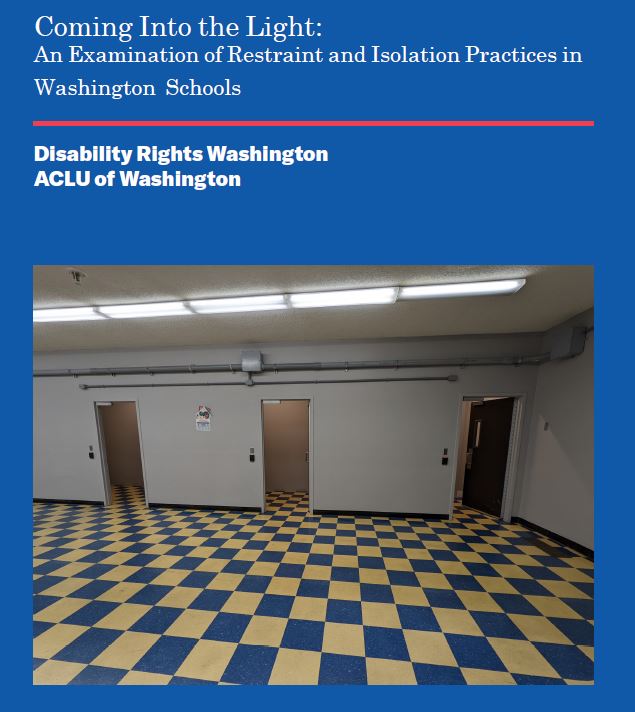
Coming Into the Light: An Examination of Restraint and Isolation Practices in Washington Schools
In 2018 DRW began monitoring the use of isolation and restraint in schools across Washington state. Seeing disparity and overuse, in 2019, DRW and the ACLU-WA began collaborating on this report. DRW conducted over 140 interviews with students, teachers, principals, parents and other school personnel, reviewed school documents, research, state laws, and did an extensive data analysis of Washington data. Report findings show that restraint and isolation have no educational or therapeutic benefits but have profound disabling effects and result in lifelong harm, especially for students with disabilities who are low-income, live in foster care or are homeless, are Black or multiracial, and are in Kindergarten or elementary school. Read more here.
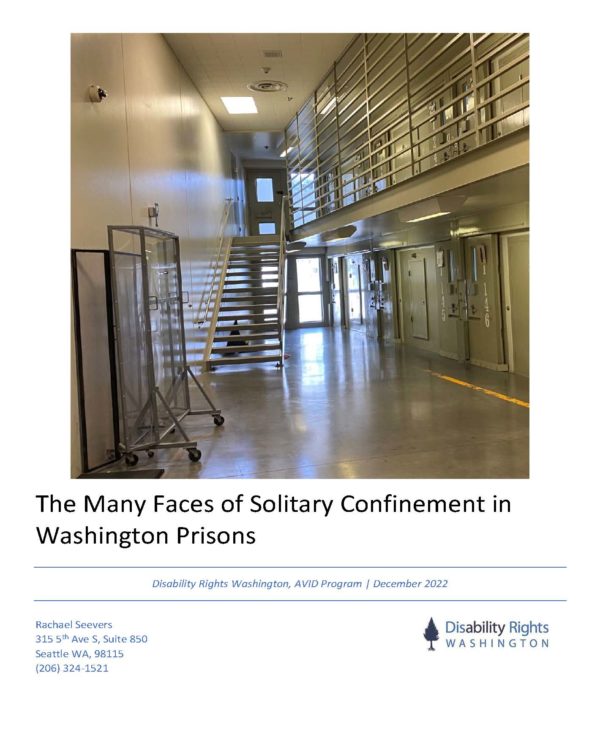
The Many Faces of Solitary Confinement in Washington Prisons
In December 2022 the AVID program released a report outlining the current state of solitary in Washington prisons and calling for reform. The report was accompanied by a video featuring a person currently in solitary, explaining the harms of solitary and the need for change.

ALL OR NOTHING Ending Washington’s Dependence On Involuntary Civil Commitment
All or Nothing, examines the gaps in Washington’s behavioral health treatment and crisis response systems, and the systemic failures in the involuntary civil commitment system that has resulted in the increased use of harmful Single Bed Certifications (“SBCs” ) and No Bed Reports (“NBRs”). All or Nothing provides clear, sensible action steps Washington can take to deliver the right care at the right time.
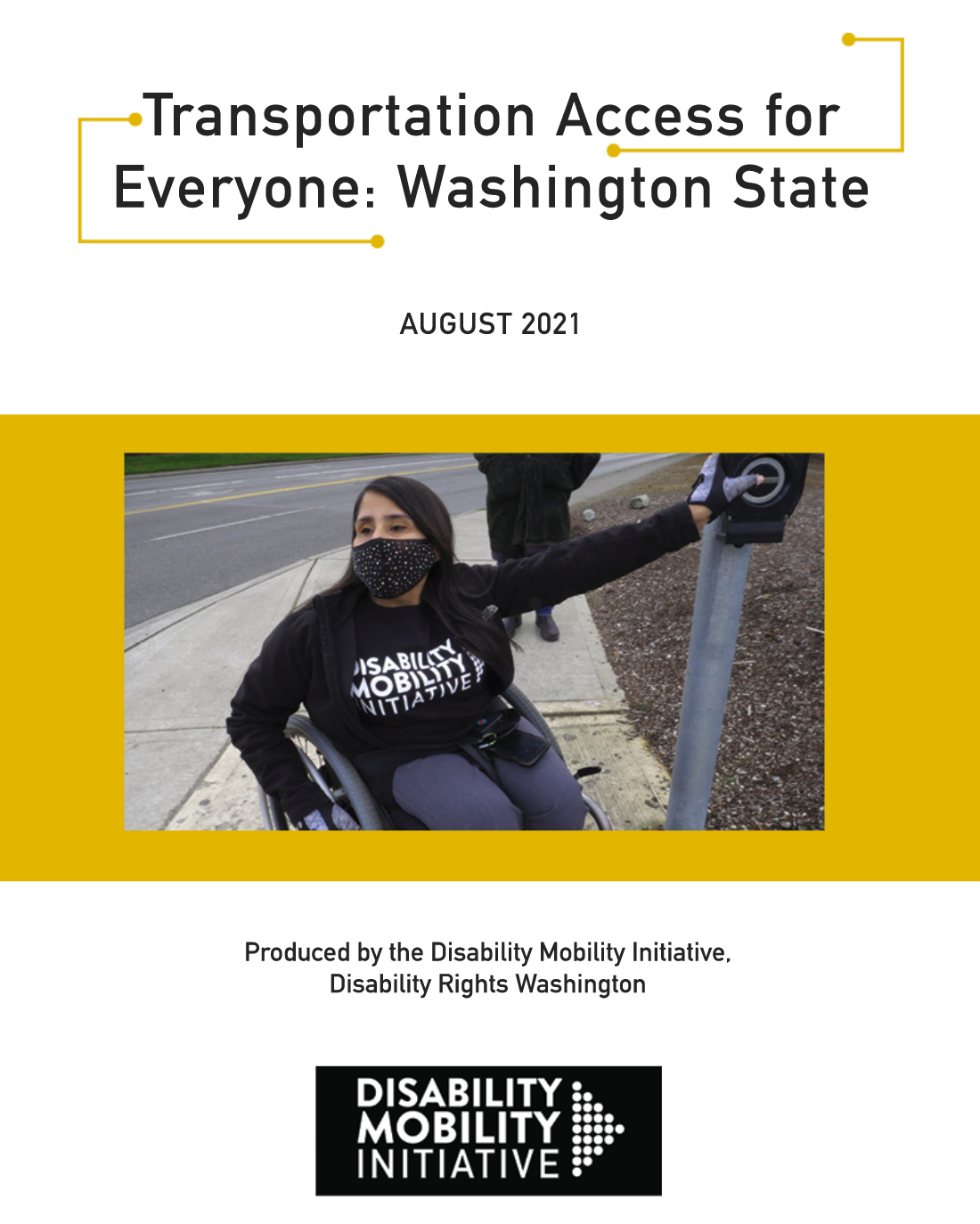
Transportation Access for Everyone: Washington State
August 2021
For the last 10 months, the Disability Mobility Initiative has interviewed over 125 disabled nondrivers from every legislative district in our state about our transportation needs. Those interviews are featured in our transportation access story map, and now we’ve compiled the expertise from those interviews into a groundbreaking research paper.
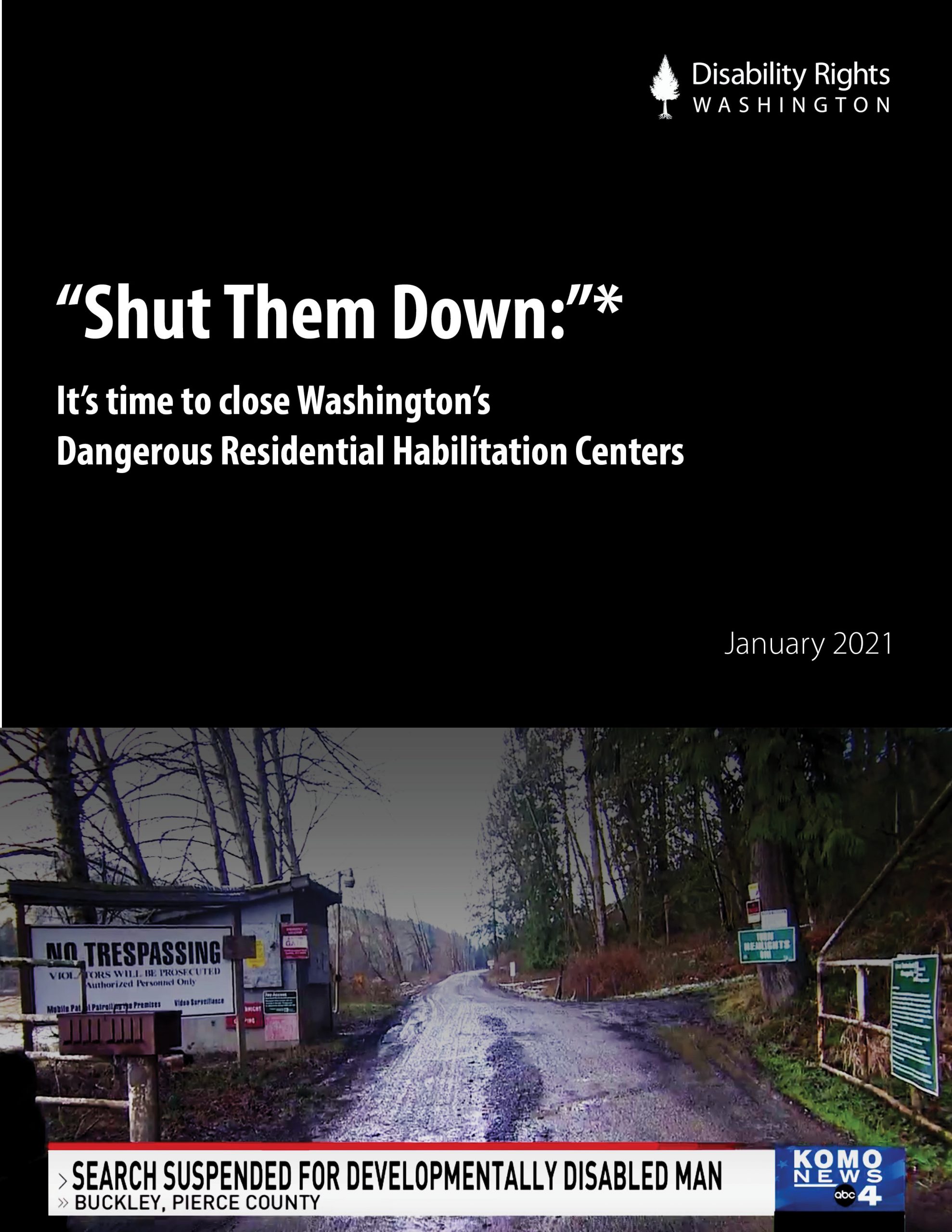
“Shut Them Down”
January 2021
In “Shut Them Down,” DRW calls out Washington’s RHCs for repeatedly showing that when major problems are discovered, they do not act swiftly or make lasting changes that prevent future harm, even when failing to remedy legal violations costs lives. The issues called out by DRW in previous reports in 2017, 2018, and 2019 have not been fixed – people with developmental disabilities are still languishing, sometimes for decades, in segregated institutions where they are continually at risk for verbal, physical, and sexual abuse and neglect.

From Hospitals to Handcuffs – Addendum Report: Spokane
ADDENDUM REPORT: SPOKANE
September 2020
In addition to DRW’s investigation into criminalization of patients in crisis in Seattle described in From Hospital to Handcuffs, DRW also looked into similar incidents in Spokane. The result of the Spokane investigation is an addendum report that should be read together with From Hospital to Handcuffs. DRW found many of the same concerns around ineffective arrest and prosecution of patients in crisis in Spokane as it did in Seattle, but Spokane also presented its own specific issues and resulting recommendations.

From Hospitals to Handcuffs
May 2020
In From Hospitals to Handcuffs, DRW found that hospital calls to police resulted in at least two patients per week being arrested, removed from treatment, and booked into jail. In most of these cases, there was no visible injury to a victim. These arrests lead to sick people stuck in jail for weeks or months, decompensating, with decreased access to needed health care. Many of the criminal cases are ultimately dismissed precisely because the person’s mental health is so compromised.

Chaotic and Dangerous
May 2019
In Chaotic and Dangerous, Disability Rights Washington’s latest report on the state-run Rainier School, DRW has found that Washington continues to put people with developmental disabilities at serious risk of harm. The report also identifies systemic failures at the institution, making clear its problems are not caused by a few bad apples, but rather grow from organizational structures that require drastic transformation by Washington State.

No Excuse for Exclusion
October 2018
In No Excuse for Exclusion, Disability Rights Washington provides a look into employment at Rainier, one of Washington’s state-run institutions where people with developmental disabilities live. The report shows people are excluded from working jobs that are integrated in the community, are paid subminimum wage, and are assigned tasks in isolated locations that are not individualized to their abilities.

Let Us Come Home
October 2018
Disability Rights Washington (DRW) has completed an investigation of Clarinda Academy, one of the many out-of-state institutions where Washington State has been sending foster youth with behavioral health needs. This investigation report discusses allegations by youth that they are subjected to verbal abuse and inappropriate/excessive physical restraints by staff.

No More Excuses
January 2018
“No More Excuses: Shining a spotlight on abuse and neglect of people with developmental disabilities living at Rainier” sheds light on the pattern of unsafe conditions and lack of treatment occurring at Rainier, as identified in the state’s own surveys. While most of this information is publically available, it is apparent that the problems continue and meaningful change is needed. This report synthesizes a single year’s worth of information to call attention to the serious harm that continues to occur.
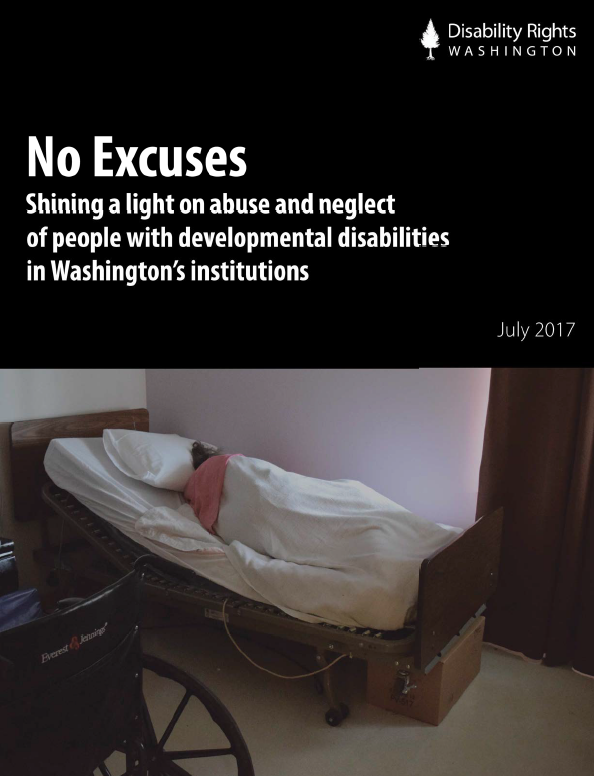
No Excuses
July 2017
“No Excuses: Shining a light on abuse and neglect of people with developmental disabilities in Washington’s institutions” sheds light on the pattern of unsafe conditions and lack of treatment in Washington’s Residential Habilitation Centers (RHCs), as identified in the State’s own surveys. This report synthesizes a single year’s worth of information to call attention to the serious harm that continues to occur. These systemic failures endanger people with developmental disabilities in all of the RHCs and cannot continue, as there are no excuses for these failures.
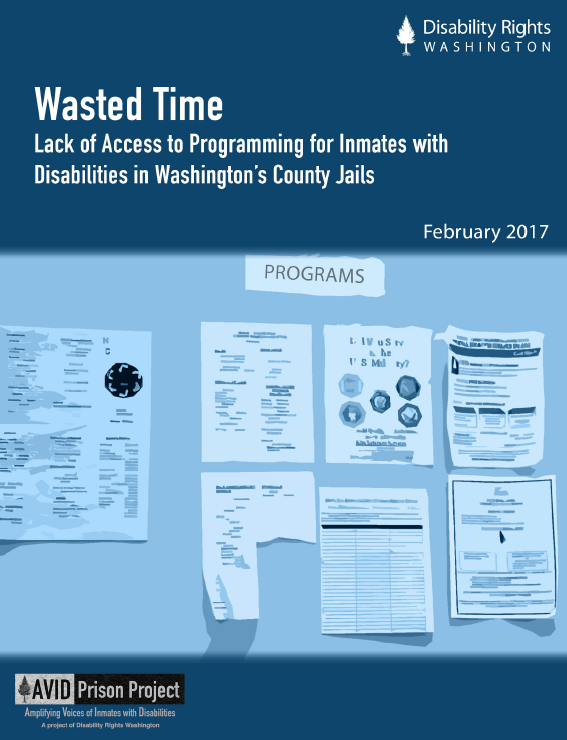
Wasted Time
February 2017
“Wasted Time: Lack of Access to Programming for Inmates with Disabilities in Washington’s County Jails” reports on the AVID Jail Project’s findings of very little programming or services for inmates. Although we incarcerate people with disabilities at disproportionately high rates, the vast majority of our jails do not make existing programs and services accessible for people with disabilities, and do not offer any programs targeted to these inmates.
This report has been updated and is current as of March 1, 2017.
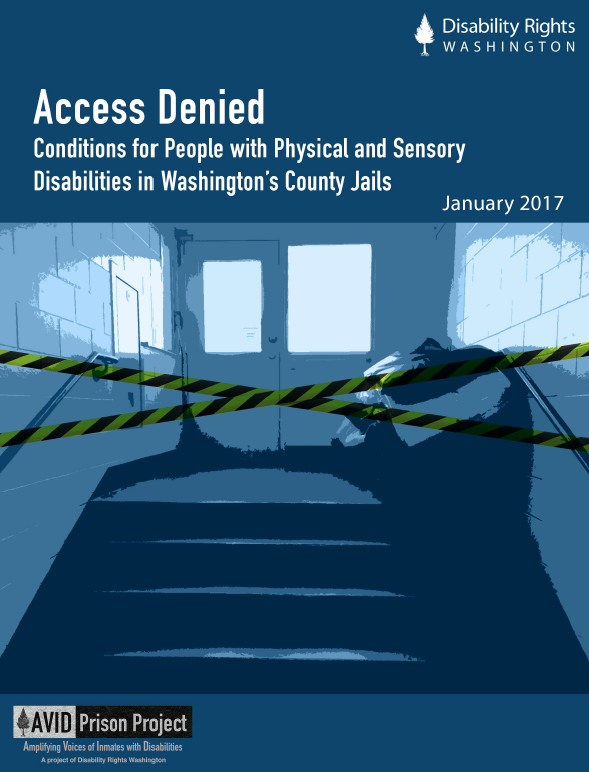
Access Denied
January 2017
“Access Denied: Conditions for People with Physical and Sensory Disabilities in Washington’s County Jails” is one report in a series of reports intended to support an informed dialogue about how Washingtonians with disabilities are treated in county jails. This report explains the types of physical barriers and accessibility issues experience by inmates with disabilities in Washington’s county jails, and makes recommendations for change. It is produced by Disability Rights Washington’s AVID Jail Project.

Cruel But Not Unusual
November 2016
Solitary confinement in Washington’s county jails disproportionately affects people with disabilities. Many jails go so far as to place inmates with disabilities in solitary confinement because of their disability. “Cruel but Not Unusual: Solitary Confinement in Washington’s County Jails” describes the harmful effects of solitary confinement on people with disabilities, provides overview of the disproportionate and discriminatory placement of people with disabilities in solitary confinement in Washington’s county jails, and identifies best practices and recommendations for reform.

Prescription for Change
October 2016
“Prescription for Change: Access to Medication for People with Disabilities in Jail” finds that our county jails often delay, disrupt or deny necessary prescription medication to people in their care. Prescription medication is a common and vital part of medical and mental health care for many people, including people with disabilities. By continuing to make it difficult or impossible for people to access necessary medication, Washington State’s jails risk violating the law and, more importantly, causing serious harm and even death.
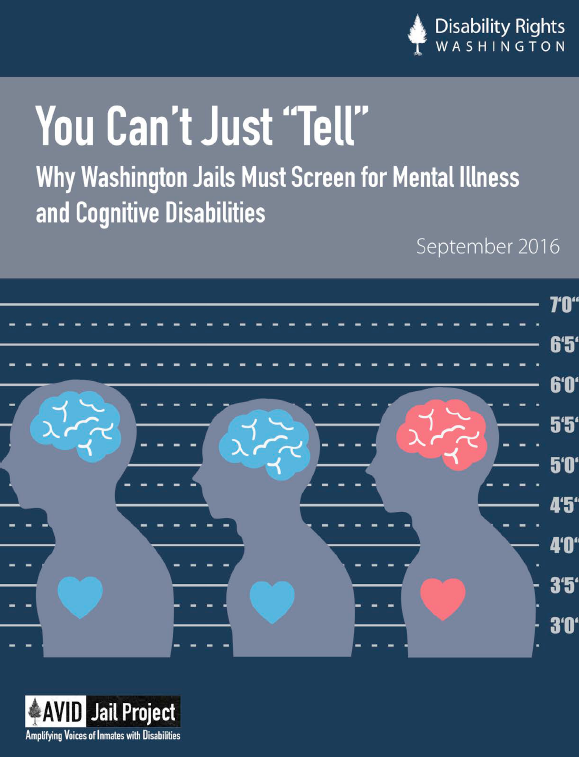
You Can’t Just “Tell”
September 2016
“You Can’t Just “Tell”: Why Washington Jails Must Screen for Mental Illness and Cognitive Disabilities” pinpoints the need for screening and early identification of inmates with disabilities to allow jails to provide legally-required services and reasonable accommodations and to maintain safety for all inmates and jail staff.

Locked Up and Locked Down
September 2016
“Locked Up and Locked Down: Segregation of Inmates with Mental Illness” describes how between 80,000 and 100,000 inmates are currently segregated in prison cells nationwide for 22-24 hours per day, for days, months, years, and in some cases decades at a time. Segregation disproportionately affects inmates with mental illness and research shows that individuals may acquire symptoms of mental illness, or experience exacerbated symptoms of mental illness, as a result of the conditions in segregation.
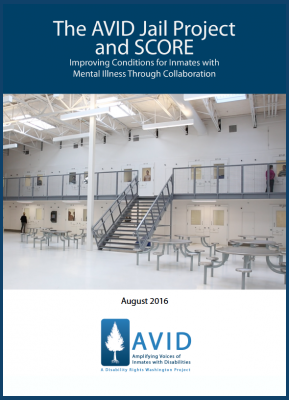
The AVID Jail Project and SCORE
August 2016
“The AVID Jail Project and SCORE: Improving Conditions for Inmates with Mental Illness Through Collaboration” explains the ongoing successful collaboration between Disability Rights Washington’s AVID Jail Project and South Correctional Entity (SCORE), a jail in South King County, Washington. The cooperative relationship between Disability Rights Washington and SCORE has produced significant positive changes for inmates with disabilities and demonstrates a path forward for all of Washington’s jails.
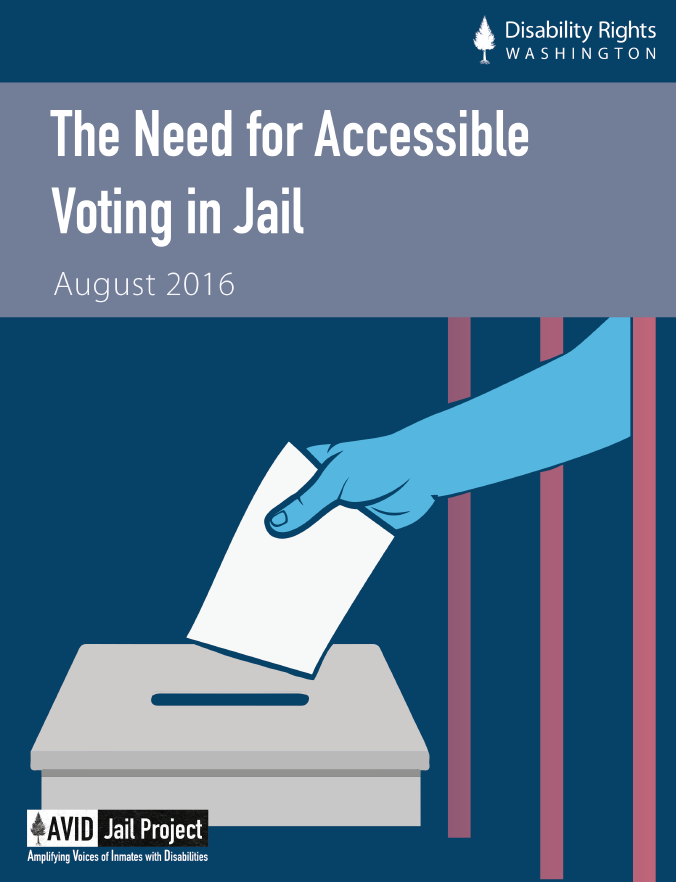
The Need for Accessible Voting in Jail
August 2016
“The Need for Accessible Voting in Jail” report calls on county jails and election offices to help jail inmates participate in the upcoming election. The report follows an investigation Disability Rights Washington’s AVID Jail Project conducted into the policies and conditions in every county jail across the state that found the vast majority of jails do nothing to support inmate voting. Read more about accessible voting in Washington’s jails.

Websites that Welcome Voters
August 2016
Many people with disabilities face barriers to voting. As a result, there is a disproportionately low turnout of Americans with disabilities in elections. Between May and July of 2016, Disability Rights Washington surveyed the elections websites of all 39 counties in Washington to screen basic accessibility of online voter information across the state. “Websites that Welcome Voters: Creating a Disability Friendly Website” is a summary of what we found, and our recommendations for improvements.
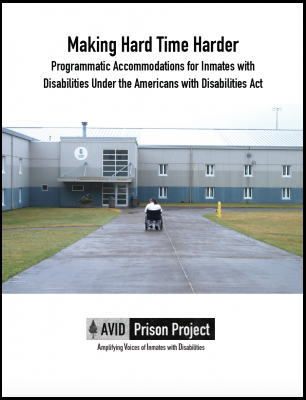
Making Hard Time Harder
June 2016
As many as 31 percent of U.S. inmates in state prisons report having at least one disability. “Making Hard Time Harder: Programmatic Accommodations for Inmates with Disabilities Under the Americans with Disabilities Act” describes how inmates with disabilities often spend more time in prison, under harsher conditions, than inmates without disabilities.
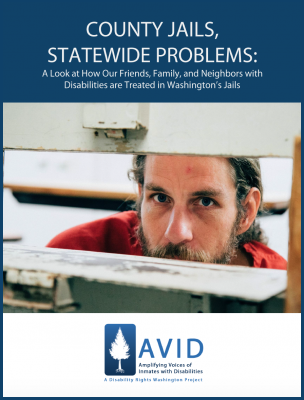
County Jails, Statewide Problems
April 2016
The high prevalence of disability in jail generates a requirement to meet the needs of numerous people with varying disabilities and medical conditions. Disability Rights Washington set out to investigate how well jails were doing in meeting the needs of people with disabilities. This report, “County jails, statewide problems: A look at how our friends, family and neighbors with disabilities are treated in Washington’s jails,” examines how friends, family, and neighbors with disabilities are treated in Washington’s jails.
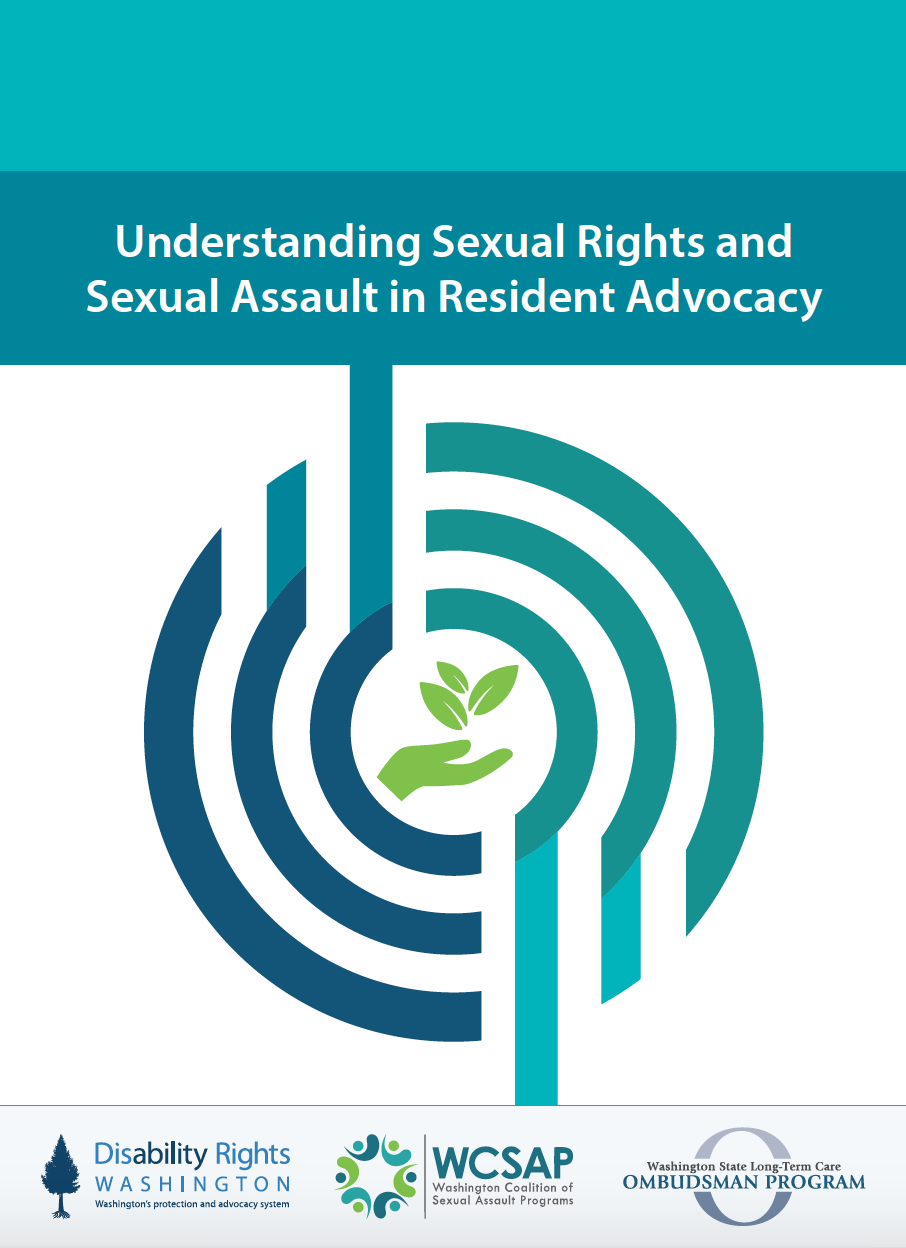
Understanding Sexual Rights and Sexual Assault in Resident Advocacy
September 2015
When long-term care residents experience sexual violence, they need access to effective advocacy. This resource booklet provides information for advocates who work in disability, long-term care, or with survivors of sexual assault.
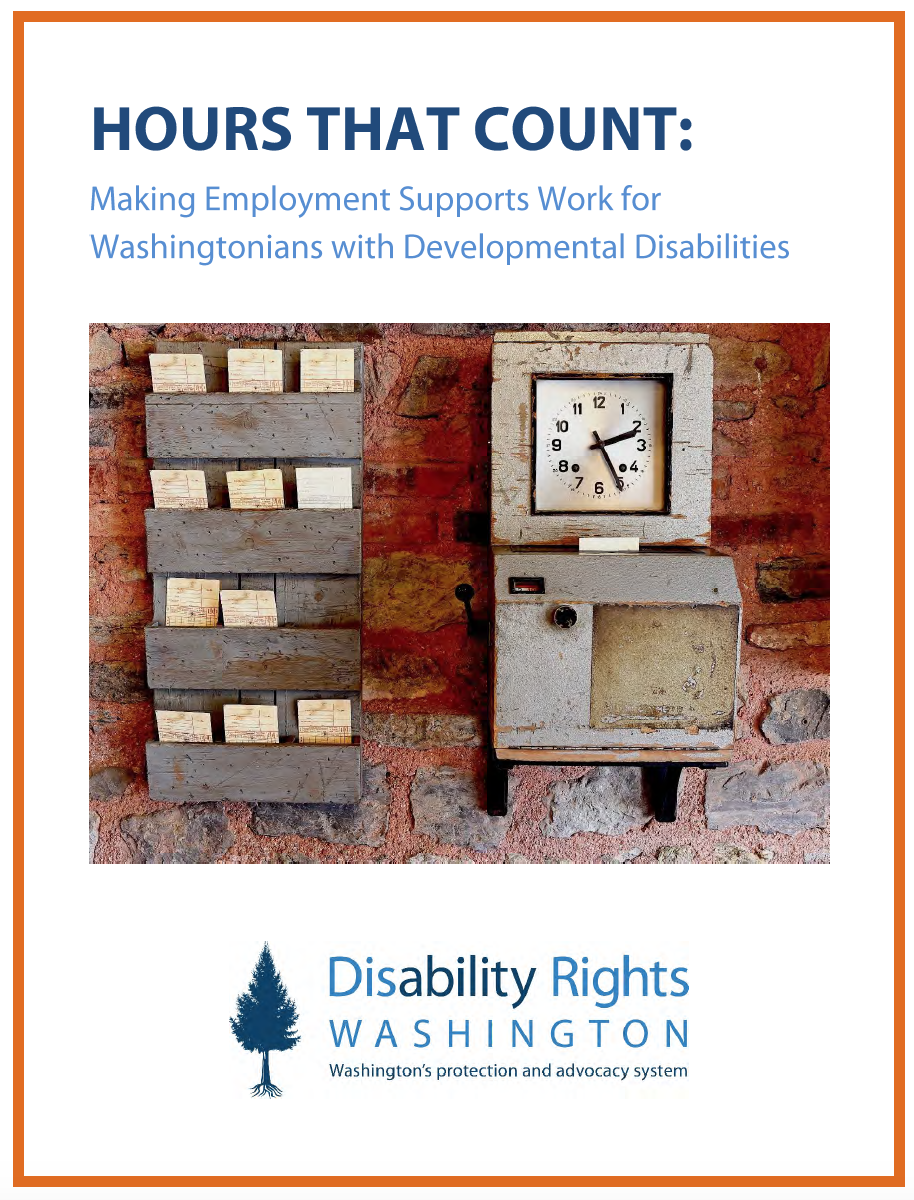
Hours that Count
November 2014
Disability Rights Washington monitored 14 employment vendors and met with multiple individuals who receive supported employment during summer 2014. Findings from this revealed many participants of Washington’s employment programs for people with developmental and intellectual disabilities still live largely isolated lives, work in segregated environments and receive little assistance to advance to integrated or viable employment. This is compiled in the report “Hours that Count: Making Employment Supports Work for Washingtonians with Developmental Disabilities”.
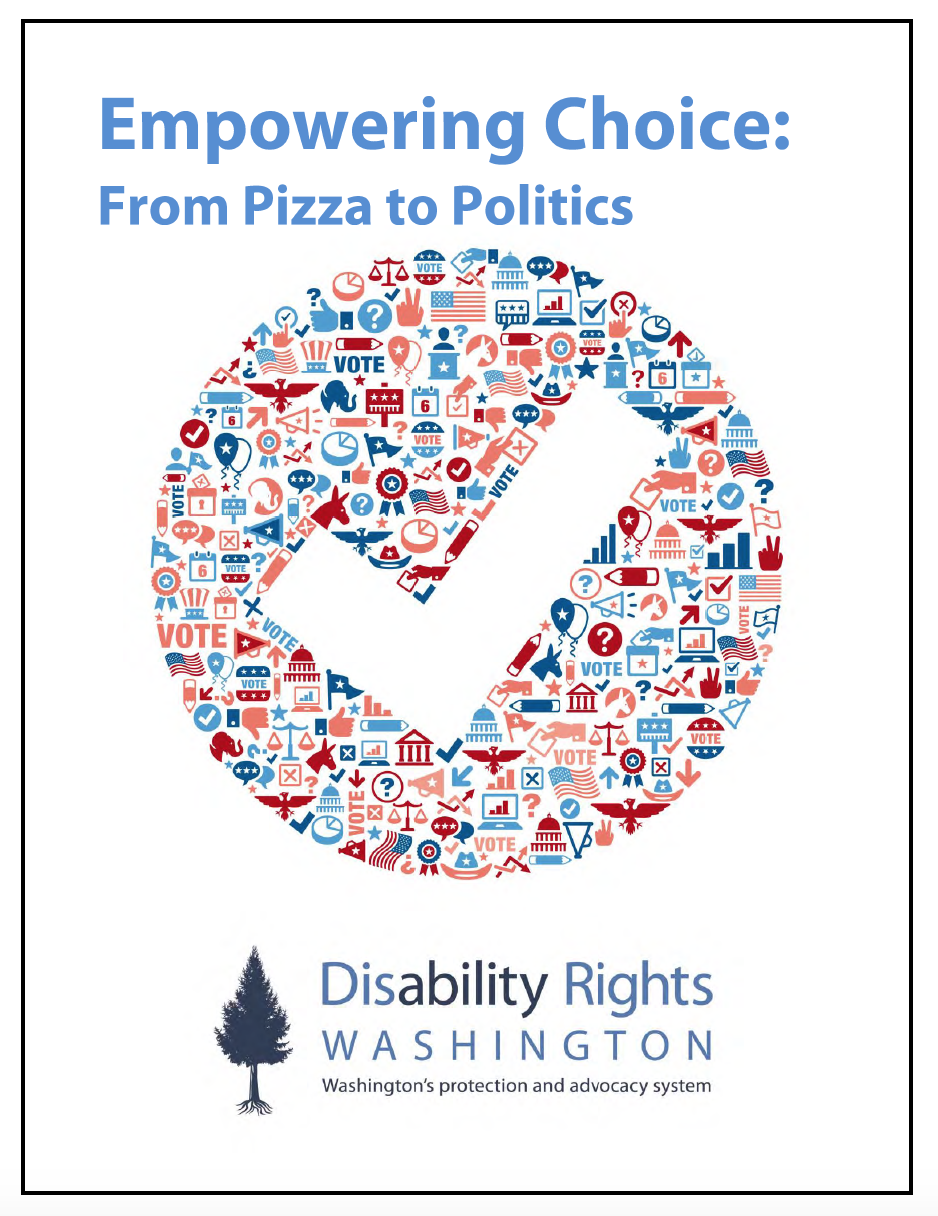
Empowering Choice
November 2013
“Empowering Choice: from Pizza to Politics” report discusses Disability Rights Washington’s observations of everyday ways in which Supported Living providers can either facilitate or hamper people’s abilities to wholly engage in community life as equal society members, as articulated in the Residential Guidelines. Disability Rights Washington identified examples in three areas of decision-making and community engagement where people with disabilities participating in Supported Living programs can be supported to increase their political enfranchisement.
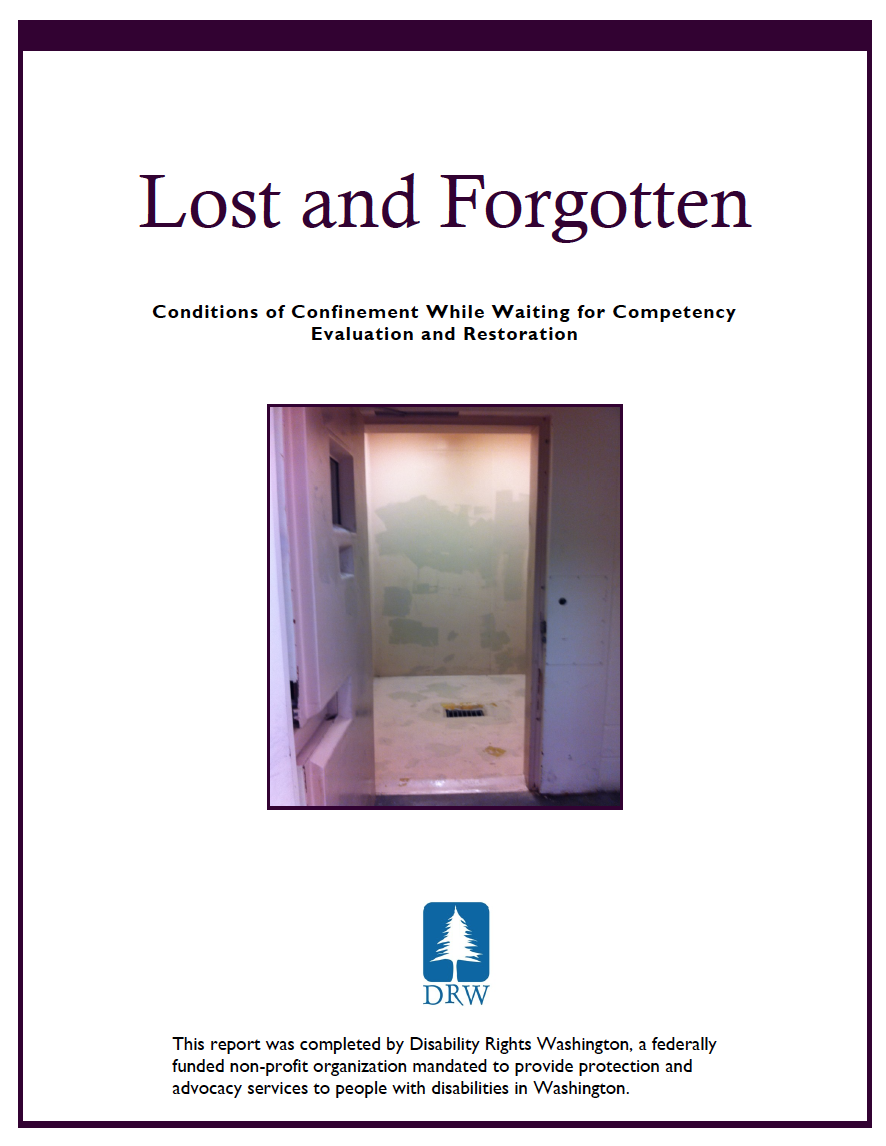
Lost and Forgotten
January 2013
People with mental illness, developmental disabilities, and traumatic brain injuries are being held in county jails from several weeks to months awaiting evaluation or restoration of their competency to stand trial. In this report, Disability Rights Washington documents the human cost of the time these individuals spend in jail, with inadequate or no mental health treatment, usually in isolation.
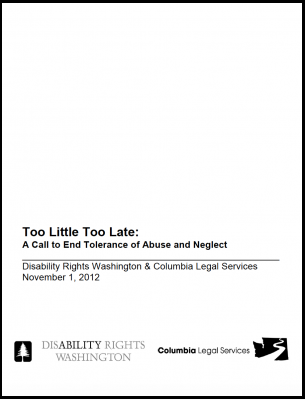
Too Little Too Late
November 2012
“Too Little Too Late: A call to end tolerance of abuse and neglect” documents the observations of Disability Rights Washington, Columbia Legal Services, and two nationally-recognized abuse and neglect response experts. Washington must stop ignoring the safety of the vulnerable citizens participating in the state’s Supporting Living program.
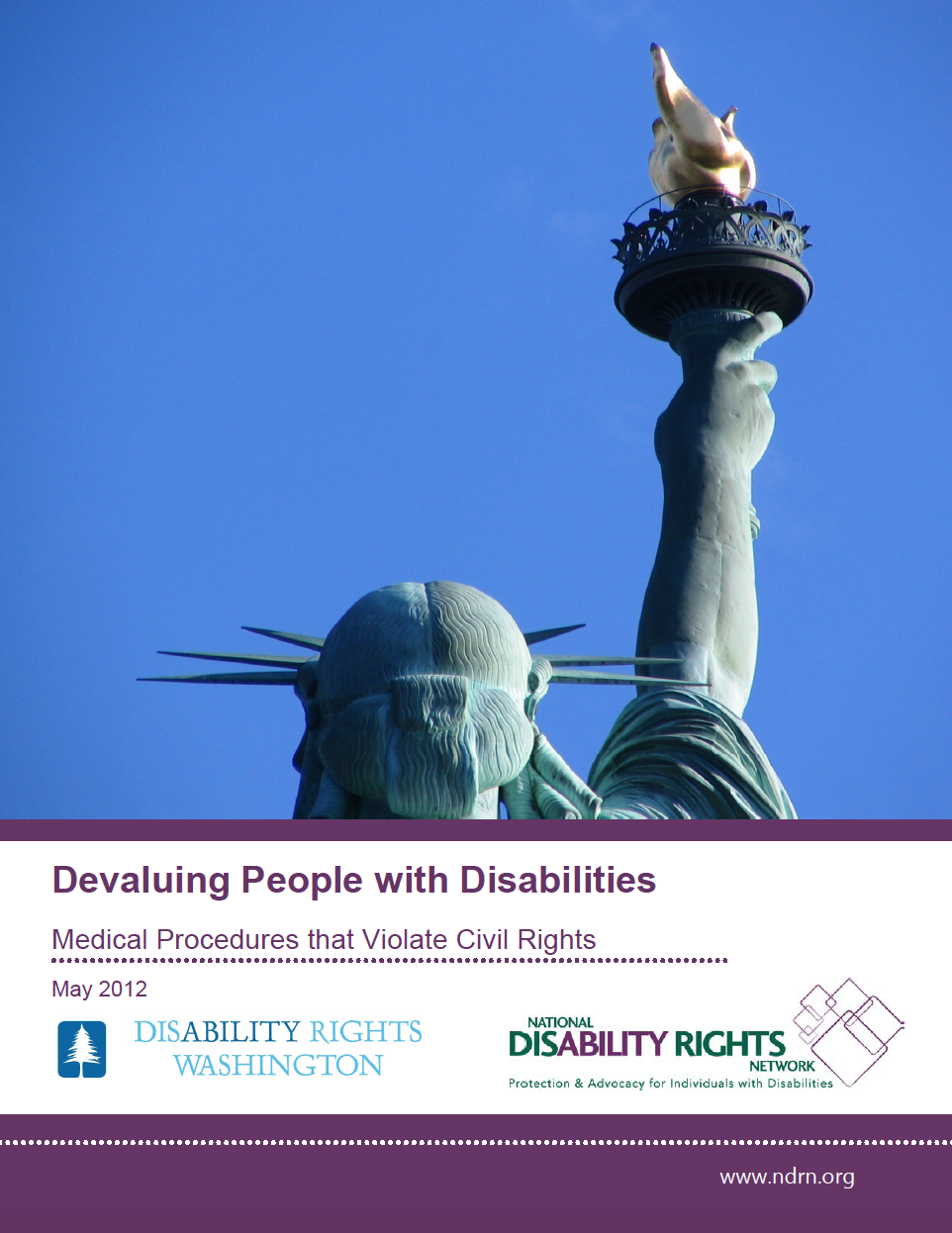
Devaluing People with Disabilities
May 2012
The thought of doctors and parents, together, deciding to remove the body parts and stunt the growth of a child based on assumptions about their awareness and quality of life is shocking and disgusting. That it is happening to those unable to use their own voice is even worse. The National Disability Rights Network—in an effort to shed some light on this barbaric practice and thrust the medical community that supports it into the 21st century—has released this report called Devaluing People with Disabilities: Medical Procedures that Violate Civil Rights.
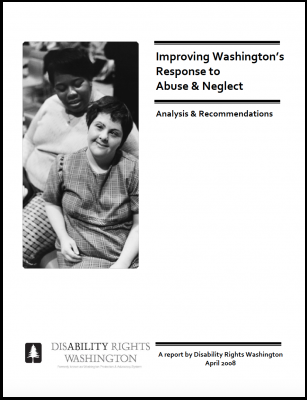
Improving Washington’s Response to Abuse and Neglect
April 2008
Washington’s system for responding to abuse and neglect of adults is currently failing to provide the protection that adults with disabilities need in order to live safely and with dignity. This report describes how the effectiveness of investigations is compromised by poorly conducted investigations, low substantiation rates, and lack of adequate policies and resources. This report also discusses other related issues including assessment of allegations, enforcement of mandatory reporting statutes, and the protection of alleged victims of abuse during ongoing investigations.
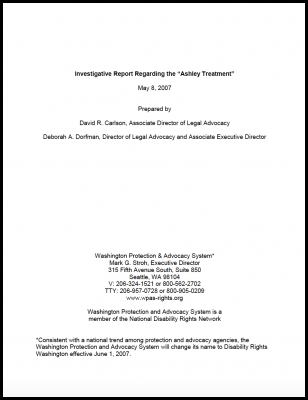
Investigative Report Regarding the “Ashley Treatment”
May 2007
Investigative Report Regarding the “Ashley Treatment” report finds that Children’s Hospital and Regional Medical Center, as a result of a communication breakdown, violated Washington state law in performing the hysterectomy portion of the “Ashley Treatment” on a 6-year old with a developmental disability without a court order authorizing the procedure.
